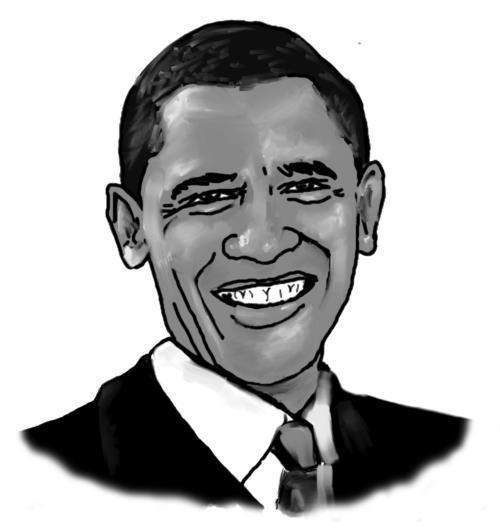
News
Summers Will Not Finish Semester of Teaching as Harvard Investigates Epstein Ties

News
Harvard College Students Report Favoring Divestment from Israel in HUA Survey

News
‘He Should Resign’: Harvard Undergrads Take Hard Line Against Summers Over Epstein Scandal

News
Harvard To Launch New Investigation Into Epstein’s Ties to Summers, Other University Affiliates

News
Harvard Students To Vote on Divestment From Israel in Inaugural HUA Election Survey
Restoring the Promise of Good Government

This Tuesday will be the first time most Harvard undergraduates are able to vote in a presidential election. For us and others our age, that fact alone makes this presidential election revolutionary. Yet all the attention paid to our generation’s enthusiasm threatens to drown out an even more potent reality—that Barack Obama is himself a transformative leader, not only because he proposes new policies, but because he will restore the promise of government that Americans have all but forgotten under George W. Bush.
Perhaps it is inevitable that a candidate who defies expectations as boldly as Obama will meet ruthless criticism. Voters have been told that Obama is an unabashed radical who “pals around” with terrorists, a troublemaker who passes off his rabble-rousing as “community organizing,” a socialist who seeks to redistribute wealth and take away personal choice, and even a self-proclaimed Messiah who puts his own ambition before the good of his country. Such allegations are desperate efforts to engender hatred against a candidate who represents sweeping change, and are simply untrue.
More troubling is the McCain campaign’s most persistent talking point: that Barack Obama is a naive, idealistic hope-monger who spouts flighty rhetoric without offering real solutions. Such claims bear little relation to the reality of the candidates’ policy proposals. The recent financial crisis offers an illustration: Senator Obama responded to the crisis with steady pragmatism, while Senator McCain naively refused to recognize the fiscal irresponsibility of cutting taxes for the wealthy, and still clings to Republican dogma that the federal government ruins everything.
The last eight years serve as proof that government can and does fail. But we support Barack Obama because we refuse to let the failures of the last president diminish our expectations for the next. Our generation will inherit the legacy of the administration that we choose on Tuesday, and if we hope to live as well as our parents did, we cannot settle for the Bush standard.
Faced with America’s collapsing economy, our unsustainable addiction to foreign oil, our inefficient and inequitable health care system, our forgotten war in Afghanistan and our mistaken war in Iraq, and our declining moral standing in the international community, we cannot afford to throw our hands up and offer the excuse that government cannot solve the problems it helped create.
Few undergraduates were old enough to vote for or against George W. Bush, so we watched helplessly as our government abdicated its responsibilities to Americans, to the world, and to the core beliefs of our democracy. But now there is no excuse. We must start to reverse the disastrous policies of the Bush administration by electing a president with the intellect, the pragmatism, and the leadership to put America back on track. That president is Barack Obama.
Neither the black-and-white, “with us or against us” ideology of George W. Bush, nor the stubbornness that John McCain and Sarah Palin like to describe as the behavior of “mavericks,” will create the change we need. But the knee-jerk rejection of all things Republican is similarly insufficient.
Instead, Americans need the pragmatic leadership that Barack Obama has amply demonstrated during his career in public service. Proving this maturity, he rejected a politically popular gas tax holiday last summer that would have reduced federal revenue without saving consumers money. He bases his decisions on science and empirical research, which the Bush administration has so emphatically rejected. James Heckman, a Nobel laureate in economics asked to review policy proposals by the Obama campaign, testified to this, noting, “I’ve never worked with a campaign that was more interested in what the research shows.”
Barack Obama will pursue bipartisan solutions. For example, he worked with Tom Coburn of Oklahoma—one of the most conservative members of the Senate—to create a “google for government” that improves transparency and accountability. That decision reveals a defining feature of Barack Obama’s governing philosophy: a pragmatic progressivism, rooted in the belief that government can effectively improve our lives when it implements sensible policies grounded in evidence.
This philosophy is hardly new. Abraham Lincoln embraced it when he surrounded himself with a “team of rivals,” putting aside grudges for the sake of preserving the Union. Dwight Eisenhower embraced it when he agreed to large-scale federal investments in the highway system. Lyndon Johnson embraced it when he lost a generation of Southern Democrats by signing the 1964 Civil Rights Act.
While their proposals may have seemed blindly hopeful at the time, all of these visionary leaders are now remembered for their contribution to the enduring theme of American history: Government, when it is motivated by the desire to find what will work for the common good, can improve our lives in ways that none of us could accomplish acting alone.
This country owes more than two centuries of progress to that fundamentally American mix of optimism and practicality. In the last eight years, Americans may have lost sight of that venerable tradition, but we have not lost our capability to revive it. We can, and we will—by electing Barack Obama on November 4th.
Eva Z. Lam ’10, Legislative Director of the Harvard College Democrats, is a social studies concentrator in Leverett House. Elise X. Liu ’11 is a social studies concentrator in Cabot House. William Weingarten ’11 is an applied math concentrator in Mather House. Liu and Weingarten are members-at-large of the Harvard College Democrats.
Want to keep up with breaking news? Subscribe to our email newsletter.
